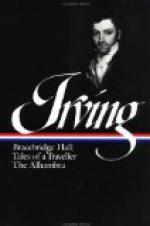The squire insists that the English gentlemen have lost much of their hardiness and manhood since the introduction of carriages. “Compare,” he will say, “the fine gentleman of former times, ever on horseback, booted and spurred, and travel-stained, but open, frank, manly, and chivalrous, with the fine gentleman of the present day, full of affectation and effeminacy, rolling along a turnpike in his voluptuous vehicle. The young men of those days were rendered brave, and lofty, and generous, in their notions, by almost living in their saddles, and having their foaming steeds ‘like proud seas under them.’ There is something,” he adds, “in bestriding a fine horse, that makes a man feel more than mortal. He seems to have doubled his nature, and to have added to his own courage and sagacity the power, the speed, and stateliness of the superb animal on which he is mounted.”
[Illustration: A Hunter]
“It is a great delight,” says old Nashe, “to see a young gentleman with his skill and cunning, by his voice, rod, and spur, better to manage and to command the great Bucephalus, than the strongest Milo, with all his strength; one while to see him make him tread, trot, and gallop the ring; and one after to see him make him gather up roundly; to bear his head steadily; to run a full career swiftly; to stop a sudden lightly; anon after to see him make him advance, to yorke, to go back and side long, to turn on either hand; to gallop the gallop galliard; to do the capriole, the chambetta, and dance the curvetty.”
In conformity to these ideas, the squire had them all on horseback at an early age, and made them ride, slap-dash, about the country, without flinching at hedge or ditch, or stone wall, to the imminent danger of their necks.
Even the fair Julia was partially included in this system; and, under the instructions of old Christy, has become one of the best horsewomen in the county. The squire says it is better than all the cosmetics and sweeteners of the breath that ever were invented. He extols the horsemanship of the ladies in former times, when Queen Elizabeth would scarcely suffer the rain to stop her accustomed ride. “And then think,” he will say, “what nobler and sweeter beings it made them. What a difference must there be, both in mind and body, between a joyous high-spirited dame of those days, glowing with health and exercise, freshened by every breeze that blows, seated loftily and gracefully on her saddle, with plume on head, and hawk on hand, and her descendant of the present day, the pale victim of routs and ball-rooms, sunk languidly in one corner of an enervating carriage.”
The squire’s equestrian system has been attended with great success, for his sons, having passed through the whole course of instruction without breaking neck or limb, are now healthful, spirited, and active, and have the true Englishman’s love for a horse. If their manliness and frankness are praised in their father’s hearing, he quotes the old Persian maxim, and says, they have been taught “to ride, to shoot, and to speak the truth.”




